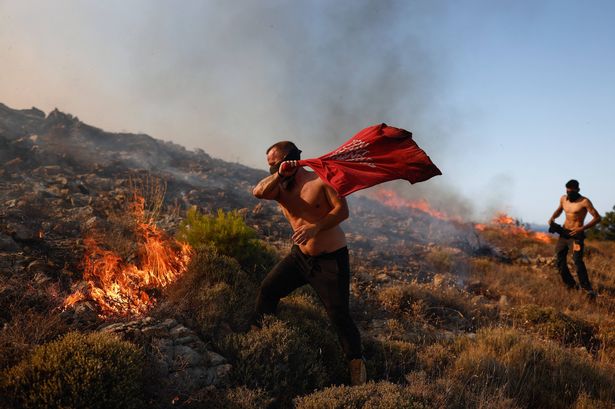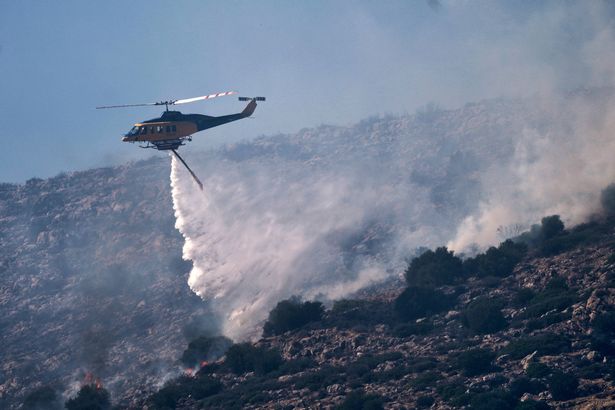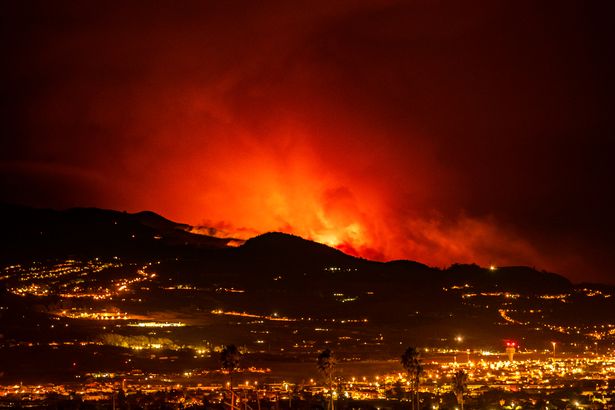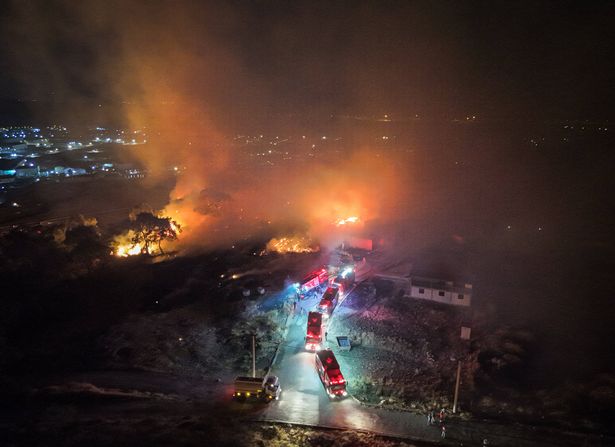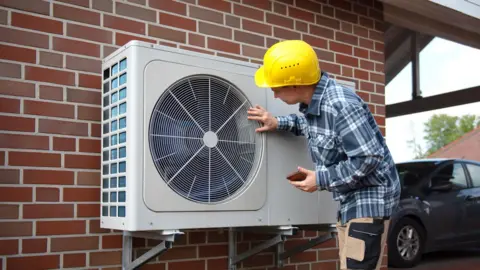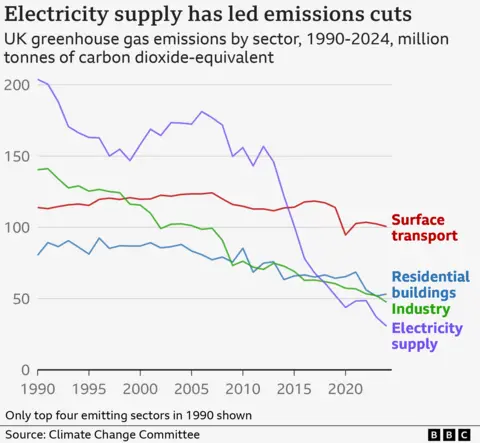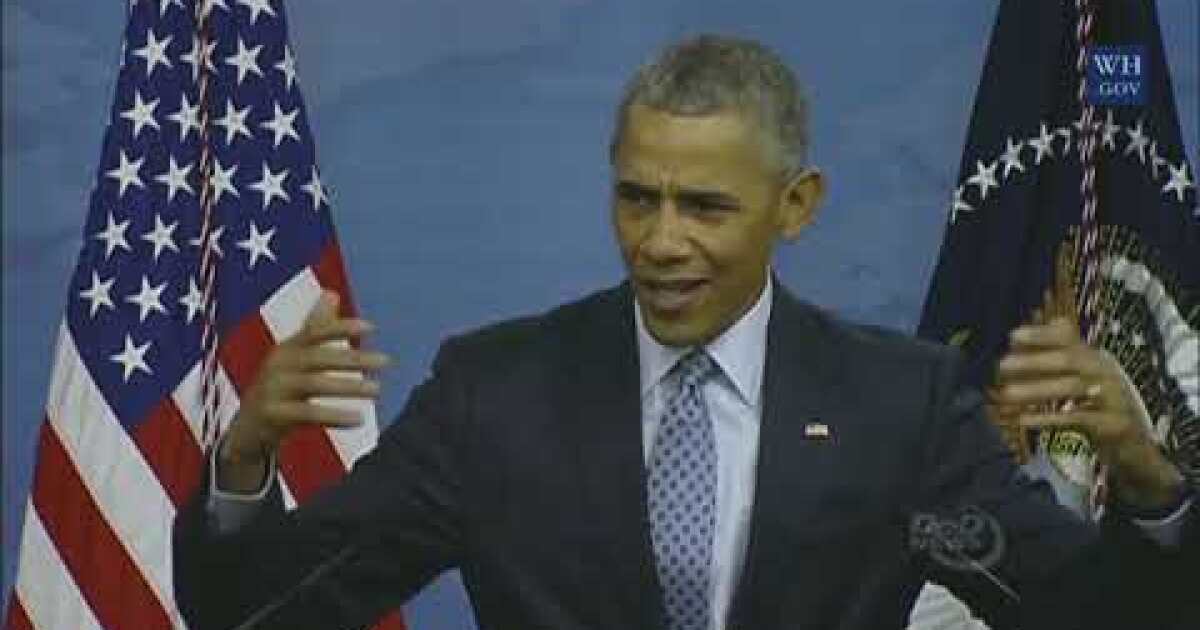Wildfires have broken out in several European countries loved by British holidaymakers, with Greece, Portugal, Spain, Italy, Turkey and France all impacted as a powerful heatwaves roasts the Continent
Wildfires have broken out across Europe as the Continent battles with ferociously hot temperatures.
The mercury could reach a ferocious 47°C in Spain this weekend, while road surfaces are beginning to melt in Italy. Those in France, Portugal, Turkey and Greece are also struggling to deal with stifling, brutally hot days and nights.
As well as the heat being a danger to the health of locals and holidaymakers alike, with one tourist already having lost their life to heatstroke in Majorca, the risk of wildfires is sky high in countries across Europe, and have already broken out in several.
It’s unlikely the heat will relent anytime soon, thanks to the heat dome currently hanging over Europe. The meteorological phenomenon occurs when a high-pressure ridge traps a thick layer of warm air in one region, acting like a lid on a pot.
The impact of human-driven climate change has only made the risk of such heatwaves worse.
Have you been impacted by the heatwave? Email [email protected]
Greece
Greece has borne the brunt of the wildfires in Europe so far this summer, with serious blazes breaking out in several areas.
A fierce blaze ripped through the area south of Athens on Thursday, leading to evacuation orders and forcing officials to shut off sections of the vital coastal route from the Greek capital to Sounion — home of the historic Temple of Poseidon and a key draw for visitors.
As a dozen aircraft and helicopters swooped in to combat the blaze from above, they supported a ground operation of 130 firefighters and their volunteer counterparts near Palaia Fokaia, on the outskirts of Athens.
The coast guard announced that two patrol boats and nine private vessels were on standby in the Palaia Fokaia area, ready for a potential sea evacuation. Fire department spokesperson Vassilis Vathrakogiannis revealed that 40 individuals had been evacuated by police, while evacuation orders were issued for five areas in total.
READ MORE: ‘Modern travel is rotting our brains but I have found a solution’READ MORE: One of world’s friendliest countries plotting to charge tourists more than locals
The wider Athens area, along with several Aegean islands, is currently on Level 4 of a 5-level scale for wildfire risk due to weather conditions, with the heatwave predicted to persist until the weekend.
Earlier this week, it took hundreds of firefighters four days to control a significant wildfire on the eastern Aegean island of Chios. Over a dozen evacuation orders were issued for Chios, where the flames consumed forests and farmland.
Wildfires are a common occurrence in Greece during its sweltering, arid summers. In 2018, a colossal fire engulfed the coastal town of Mati, east of Athens, trapping residents in their homes and on escape routes. The disaster claimed over 100 lives, including some who tragically drowned while attempting to swim away from the inferno.
Spain
So far, wildfires have been limited in Spain, but the threat is rising as the country braces for seriously high temperatures over the coming days. The mercury could reach a ferocious 47°C in Spain this weekend.
On Thursday, a forest fire broke out in the Talavera de la Reina region, creating a column of smoke visible from the city. A total of 10 vehicles — two of them aerial — and 38 personnel were called in to put it out.
The Canary Islands government has issued a warning for Gran Canaria starting this Saturday due to high temperatures across the entire island. There is a risk of forest fires at altitudes above 400 metres.
Temperatures in Gran Canaria are expected to exceed 34°C this weekend and will likely approach 37°C, with strong winds increasing the danger. The Canary Islands government is urging the public to avoid lighting fires — even in barbecues or recreational areas — and to avoid using tools or machinery that could produce sparks, such as chainsaws, brush cutters, or welders.
A pre-alert for heat has been issued for the rest of the archipelago, with temperatures expected to be around 30–34°C (86–93°F) on El Hierro, La Gomera, Lanzarote, and Fuerteventura, as well as on the eastern, southern, and western slopes of Tenerife, and 26–32°C (79–90°F) on the northern coast of Gran Canaria.
Portugal
Wildfires are serious business in Portugal.
Last year, there were 6,267 individual wildfires recorded, with 16 people losing their lives as a result. In total, 137,000 hectares were destroyed — an area four times larger than the previous year. So far this year, 22 people have been arrested for arson, according to Público.
The total financial loss last year in Portugal — including materials, biomass for energy, fruits, and stored carbon — reached around 67 million euros and affected 2.36 million cubic metres of wood.
While last year was, hopefully, an outlier in terms of wildfire severity, with temperatures nudging 40°C in parts of Portugal this weekend, blazes are likely.
Italy
The boot-shaped country is also facing the risk of wildfires this weekend, with unrelenting sunshine and highs nudging 40°C in the south.
Today, two fires broke out near Rome and in Dragoncello. Flames and smoke rose up, threatening to engulf several properties.
Turkey
Wildfires broke out in eight provinces in Turkey on a single day this week. Most were in western provinces — areas where many Europeans travel on holiday.
All fires were brought under control after coordinated air and ground efforts. According to the General Directorate of Forestry, five of the fires began in rural areas and later spread to nearby forests. “Fifty percent of wildfires start in agricultural zones. Small acts of negligence can lead to major disasters,” the authority warned, urging the public not to “set our future on fire.”
One of the most dangerous blazes broke out in the Osmangazi district of the northwestern province of Bursa. Fueled by strong winds, the flames quickly spread from forested areas to nearby residential zones.
READ MORE: Inside North Korea’s vast new beach resort as Kim Jong Un bets on tourismREAD MORE: Ryanair reveals eye-watering amount it really makes from bag and seat fees
France
France has yet to be hit by major wildfires this year, but firefighters are on high alert this weekend.
The Bouches-du-Rhône is on orange alert, and the Alpes-de-Haute-Provence and Vaucluse are on yellow alert due to the intense heat expected to persist into the weekend. Strong winds may make matters more difficult to control if a blaze does break out.
According to La Provence, the “risk of major fires is high.”
Let me know if you’d like this shortened or rewritten for publication (e.g., news website, print, or social media).
